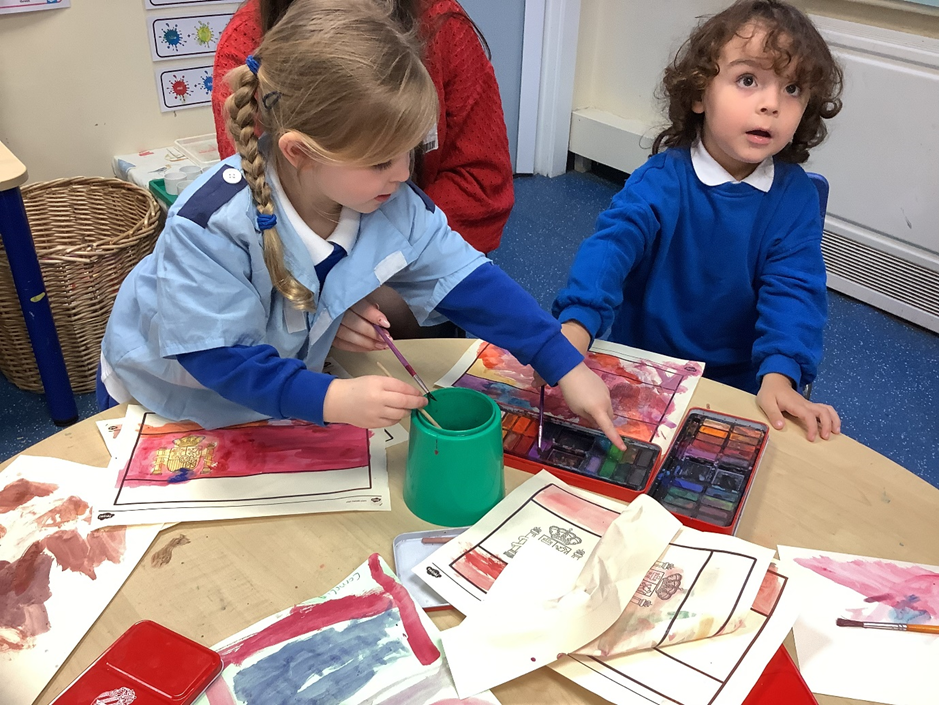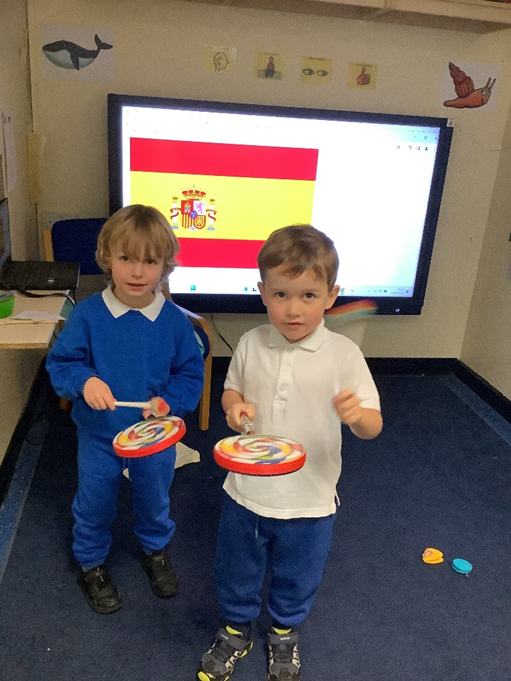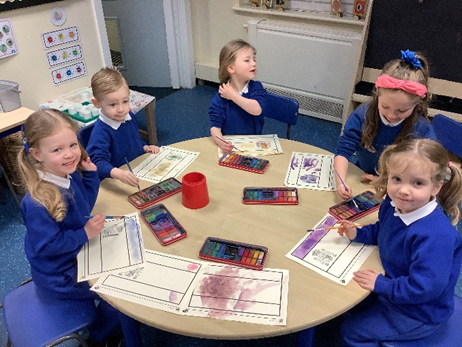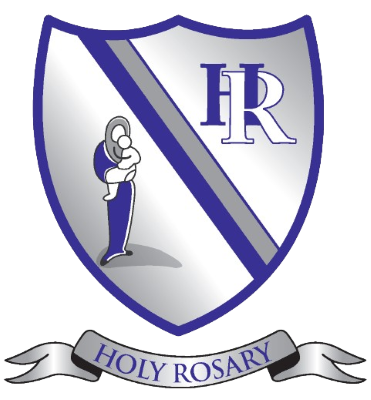Spanish
Spanish at Holy Rosary

"Learning a new language is like unlocking a secret code to a whole new world of fun and friends!" - Unknown
Intent
Spanish has been chosen for instruction at Holy Rosary due to its status as the second most widely spoken international language after English. It aligns with the likelihood of our children using it, given their frequent visits to Spanish-speaking countries during holidays.
We meticulously plan and deliver a structured series of lessons, ensuring a gradual coverage of skills mandated by the national curriculum. Our selected themes — Aprendo Espanol (I am learning Spanish) serves as an introduction to the culture of Spanish-speaking nations and communities.
The objective is to cultivate a passion for learning and deepen their global awareness. Employing a sequential curriculum allows children to steadily advance their skills, enabling expression of ideas and thoughts in Spanish, both verbally and in writing. Our aim is to familiarise them with authentic Spanish, often instructed by a non-native speaker.
In Lower KS2, the focus is on establishing foundational skills in Spanish with a strong emphasis on fostering Speaking and Listening abilities. Upper KS2 builds upon these, integrating Reading and Writing skills, progressing to more intricate language concepts and promoting greater learner independence.
Our aspiration is to ignite a passion for learning and mutual understanding by exemplifying a love for languages. We seek to broaden their horizons to diverse countries, cultures, and communities, nurturing children into inquisitive, self-assured, and contemplative language learners. Our ultimate goal is to provide them with a solid foundation that prepares them for continued language studies.
Implementation
At Holy Rosary, our Spanish language journey starts in Year 3, where scheduled lessons introduce us to the basics. From there, each year builds upon our skills until we finish Year 6. Our focus revolves around the practical aspects of learning a language. Our class teachers use the Language Angels program, employing various tools like PowerPoint presentations, games, and worksheets to make our Spanish learning interactive. Beginning with essential vocabulary encompassing greetings, self-expression, colours, numbers, time, fundamental grammar, and the alphabet, we gradually progress to broader topics including Presenting Myself and Do You Have a Pet?
The lessons are designed to be engaging, straightforward, and enjoyable, employing repetition and games to solidify our understanding. We are looking forward to having a Spanish day to celebrate national languages' day in February 2024. Where we will be immersing ourselves in Spanish culture, exploring festivals, traditions, and food.
All these experiences collectively prepare us to become confident linguists, equipped to communicate not just in the workforce but also as we explore the world, feeling at ease and at home wherever our journeys take us.
Impact
The Spanish curriculum at Holy Rosary aims to instil in children a genuine interest in learning other languages in an engaging and enjoyable manner. Our focus is on nurturing their confidence while stimulating curiosity about language. We purposefully create connections to enhance their understanding of cultural distinctions in other nations.
Structured to progressively advance language skills, our MFL curriculum consists of regular lessons where children gradually acquire, employ, and employ an expanding range of vocabulary centred around various topics. These encompass numbers, colours, household items, cuisine, the classroom environment, clothing, and hobbies.
Our ultimate goal is for children leaving Holy Rosary to possess a natural curiosity and confidence to explore diverse countries, cultures, and languages. Recognising the value of effective communication in a multilingual society, we aim to equip them with the invaluable skill of interacting proficiently in another language. We strive to embed crucial listening, speaking, reading, and writing skills, enabling children to use and apply their Spanish learning in diverse contexts. This foundation lays the groundwork for their future language acquisition and application.
Language Angels at home
Your child has a special Language Angels login, offering the opportunity to practice and explore new languages at home. Click the link below to visit the Language Angels website
https://www.languageangels.com/schools/login

You can also use the free app Duolingo to practise language skills.
International Languages Day
In celebration of National Language Day, here at Holy Rosary we held our very first "Spanish Day," during which we explored many of the rich cultural traditions of Spain. Each year group engaged in a range of activities- including speaking and listening, music, cooking and dancing- with every class getting fully involved!
Even though Spanish is not introduced into the curriculum until Key Stage 2, both Early Years Foundation Stage and Key Stage 1 enthusiastically joined in, contributing to a comprehensive whole-school celebration. This initiative provided them with a preview of what awaits them in Key Stage 2 when they will begin to learn to speak, read and write in Spanish. Our first Holy Rosary Spanish Day was a great success!
Year 6
Year 6 participated in a delightful paella cooking workshop hosted by Mother Dough Culinary. During the class, they discovered the origins of the dish and explored why it holds such popularity in Spain. The students acquired skills in dicing, chopping, and simmering the ingredients involved in preparing paella. The children thoroughly enjoyed preparing, crafting, and savouring their paella—it was a big hit!
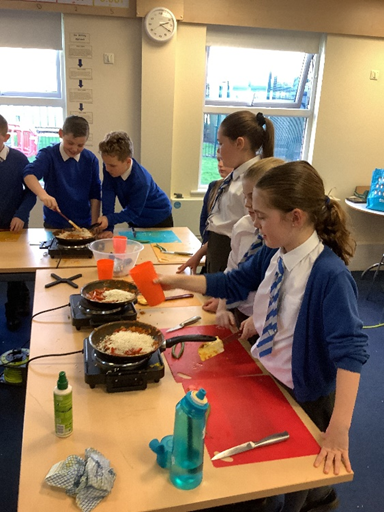
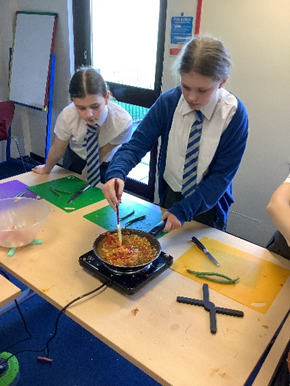
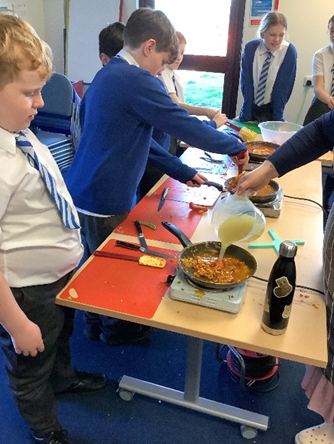
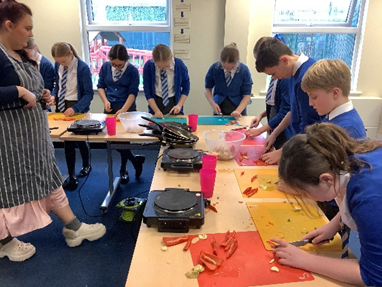
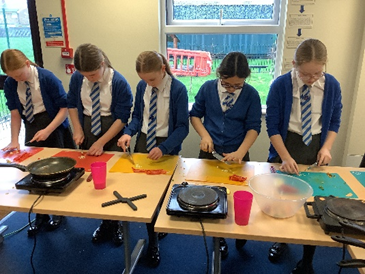
Year 3, 4 and 5
Students from Years 3, 4, and 5 engaged in a skilled flamenco dance session led by 'Espiritu Flamenco,' accompanied by a talented guitarist. The lesson highlighted that Flamenco has its roots in Andalusia, Spain, and is a cherished traditional Spanish dance form still celebrated today. The children delved into the techniques of clapping, stamping, and moving in sync with the captivating Spanish guitar music. Both students and staff were impressed by the class, with one student expressing that it was “the best thing they have ever done!”.
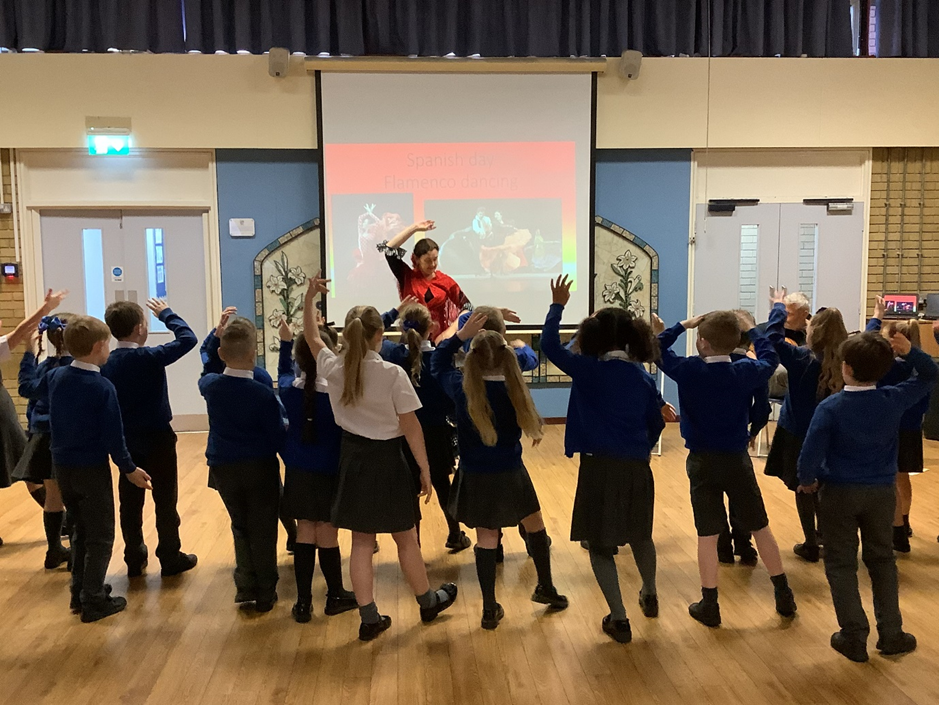
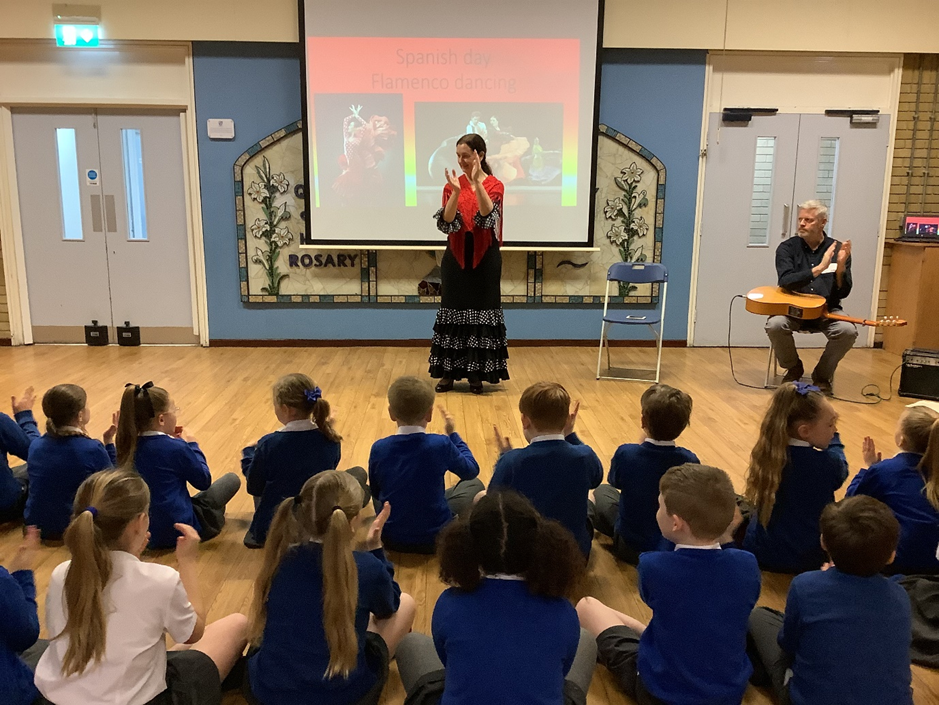
Year 2
Year 2 participated in our festivities by exploring the works of the Spanish artist Joan Miró, who hailed from Barcelona. Upon discovering that Miró was a surrealist artist with a distinct approach to art, incorporating primary colours, lines, and shapes, Year 2 embarked on creating their own artworks inspired by Miró's style. The result was a collection of delightful and unique pieces of art!
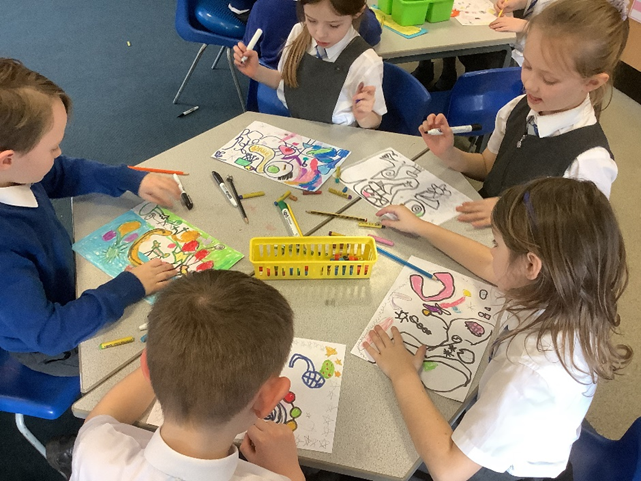
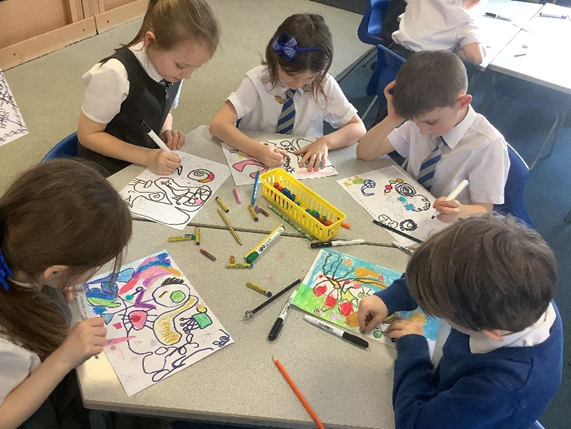
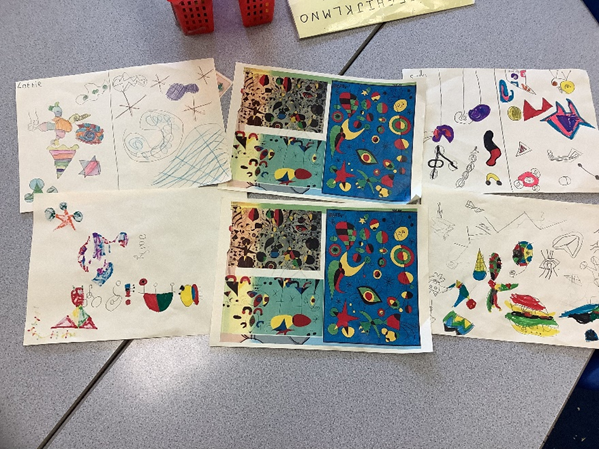
Year 1
Year 1 had a fantastic afternoon participating in Spanish Day celebrations. They engaged in discussions about Spanish culture and traditions, focusing on tapas. Year 1 had the fortunate opportunity to indulge in a tasty tapas tasting session, sampling dishes such as chorizo, tortilla, queso manchego, and churros! It is safe to say churros were a firm favourite! Additionally, they learned the pronunciation of Spanish phrases and coloured in a Spain flag.
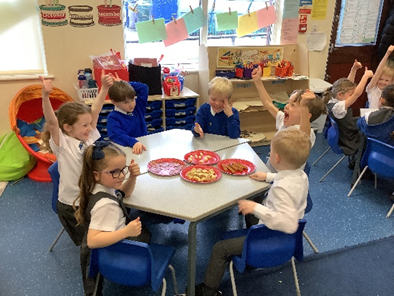
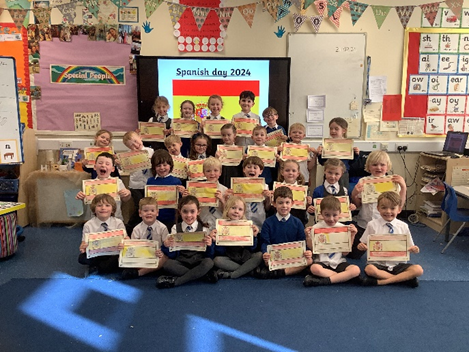
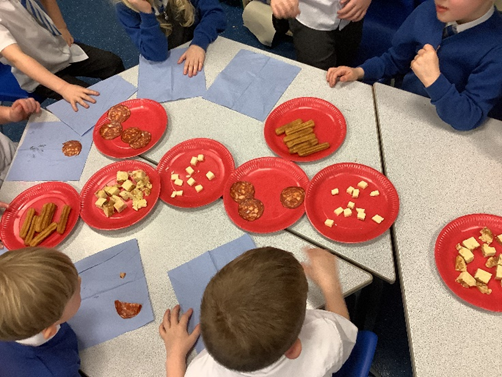
Reception
The Reception classes enjoyed a delightful afternoon watching traditional flamenco dance videos. They crafted fans, mimicking the ones used in flamenco performances, and enthusiastically imitated the dance moves! They learned songs with Spanish phrases, acquiring the skill of greeting people in the process.
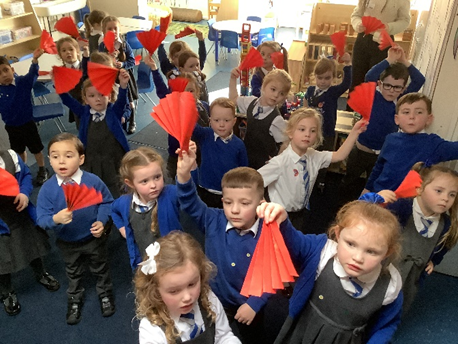
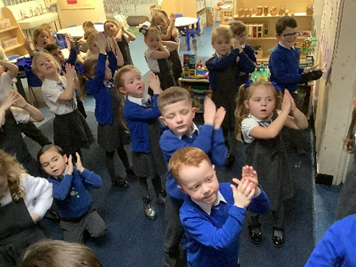
Nursey
Nursery also explored the flamenco style of dancing and actively participated in imitating the dance style and moves. They sang Spanish songs related to colours and greetings. Additionally, they coloured Flamenco dancers and Spanish flags.
